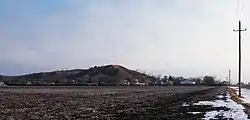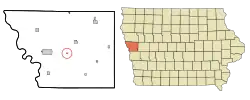Turin, Iowa
Turin is a city in Monona County, Iowa, United States. The population was 72 at the time of the 2020 census.[2]
Turin, Iowa | |
|---|---|
 | |
 Location of Turin, Iowa | |
| Coordinates: 42°1′15″N 95°58′3″W | |
| Country | |
| State | |
| County | Monona |
| Area | |
| • Total | 0.09 sq mi (0.23 km2) |
| • Land | 0.09 sq mi (0.23 km2) |
| • Water | 0.00 sq mi (0.00 km2) |
| Elevation | 1,053 ft (321 m) |
| Population (2020) | |
| • Total | 72 |
| • Density | 800.00/sq mi (309.62/km2) |
| Time zone | UTC-6 (Central (CST)) |
| • Summer (DST) | UTC-5 (CDT) |
| ZIP code | 51059 |
| Area code | 712 |
| FIPS code | 19-79185 |
| GNIS feature ID | 0462360 |
History
Turin was platted in 1887.[3] It was named after Turin, in Italy.[3] A post office was established at Turin in 1887, and remained in operation until it was discontinued in 1996.[4]
Geography
Turin is located at 42°1′15″N 95°58′3″W (42.020792, -95.967541).[5] It is situated near the confluence of the Little Sioux and Maple rivers.
According to the United States Census Bureau, the city has a total area of 0.09 square miles (0.23 km2), all land.[6]
Demographics
| Year | Pop. | ±% |
|---|---|---|
| 1910 | 154 | — |
| 1920 | 158 | +2.6% |
| 1930 | 167 | +5.7% |
| 1940 | 184 | +10.2% |
| 1950 | 160 | −13.0% |
| 1960 | 163 | +1.9% |
| 1970 | 115 | −29.4% |
| 1980 | 103 | −10.4% |
| 1990 | 95 | −7.8% |
| 2000 | 75 | −21.1% |
| 2010 | 68 | −9.3% |
| 2020 | 72 | +5.9% |
| Source:"U.S. Census website". United States Census Bureau. Retrieved March 29, 2020. and Iowa Data Center Source: | ||
2010 census
As of the census[8] of 2010, there were 68 people, 33 households, and 19 families living in the city. The population density was 755.6 inhabitants per square mile (291.7/km2). There were 38 housing units at an average density of 422.2 per square mile (163.0/km2). The racial makeup of the city was 97.1% White and 2.9% African American.
There were 33 households, of which 21.2% had children under the age of 18 living with them, 48.5% were married couples living together, 6.1% had a female householder with no husband present, 3.0% had a male householder with no wife present, and 42.4% were non-families. 33.3% of all households were made up of individuals, and 9.1% had someone living alone who was 65 years of age or older. The average household size was 2.06 and the average family size was 2.68.
The median age in the city was 52.5 years. 19.1% of residents were under the age of 18; 2.9% were between the ages of 18 and 24; 19.1% were from 25 to 44; 29.5% were from 45 to 64; and 29.4% were 65 years of age or older. The gender makeup of the city was 54.4% male and 45.6% female.
2000 census
As of the census[9] of 2000, there were 75 people, 34 households, and 24 families living in the city. The population density was 892.4 inhabitants per square mile (344.6/km2). There were 39 housing units at an average density of 464.0 per square mile (179.2/km2). The racial makeup of the city was 98.67% White and 1.33% Native American.
There were 34 households, out of which 20.6% had children under the age of 18 living with them, 55.9% were married couples living together, 11.8% had a female householder with no husband present, and 26.5% were non-families. 20.6% of all households were made up of individuals, and 8.8% had someone living alone who was 65 years of age or older. The average household size was 2.21 and the average family size was 2.52.
In the city, the population was spread out, with 18.7% under the age of 18, 9.3% from 18 to 24, 24.0% from 25 to 44, 30.7% from 45 to 64, and 17.3% who were 65 years of age or older. The median age was 44 years. For every 100 females, there were 92.3 males. For every 100 females age 18 and over, there were 79.4 males.
The median income for a household in the city was $23,750, and the median income for a family was $21,875. Males had a median income of $24,792 versus $16,875 for females. The per capita income for the city was $15,094. There were 21.2% of families and 21.6% of the population living below the poverty line, including 52.6% of under eighteens and none of those over 64.
Education
West Monona Community School District operates public schools serving the community.[10]
References
- "2020 U.S. Gazetteer Files". United States Census Bureau. Retrieved March 16, 2022.
- "2020 Census State Redistricting Data". census.gov. United states Census Bureau. Retrieved August 12, 2021.
- Chicago and North Western Railway Company (1908). A History of the Origin of the Place Names Connected with the Chicago & North Western and Chicago, St. Paul, Minneapolis & Omaha Railways. p. 132.
- "Monona County". Jim Forte Postal History. Retrieved March 30, 2015.
- "US Gazetteer files: 2010, 2000, and 1990". United States Census Bureau. February 12, 2011. Retrieved April 23, 2011.
- "US Gazetteer files 2010". United States Census Bureau. Archived from the original on January 25, 2012. Retrieved May 11, 2012.
- "Census of Population and Housing". Census.gov. Retrieved June 4, 2015.
- "U.S. Census website". United States Census Bureau. Retrieved May 11, 2012.
- "U.S. Census website". United States Census Bureau. Retrieved January 31, 2008.
- "West Monona." Iowa Department of Education. Retrieved on February 25, 2019.